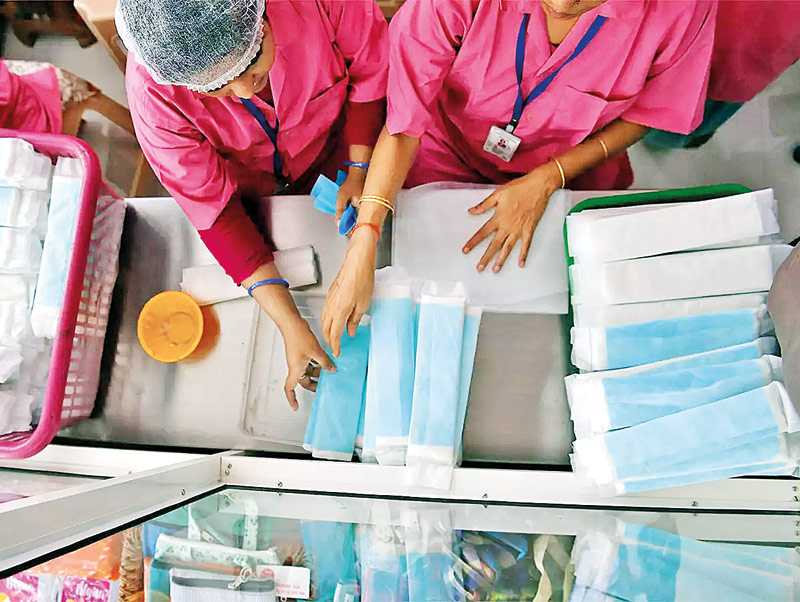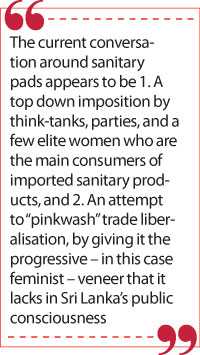Monday Feb 23, 2026
Monday Feb 23, 2026
Thursday, 3 December 2020 00:00 - - {{hitsCtrl.values.hits}}

Sanitary pads are what is called an “inelastic” good in economic jargon, meaning that demand for them is not likely to change with price levels because of their essential nature. The idea that retailers will automatically reduce prices to reflect lower taxation is a theory, and doesn’t account for the possibility of lower taxes leading to higher profits for retailers
By Shiran Illanperuma
The SLPP Government’s proposals for Budget 2021 have revived a simmering debate about the taxation on imported menstrual hygiene products. Some Sri Lankan economists and activists have characterised taxes on these products as “anti-women” and called for their abolition.
While acknowledging that menstruation remains a taboo subject in Sri Lanka, and that lack of access to menstrual hygiene products reduces women’s mobility and participation in society, the framing of this conversation, and its emergence in the absence of an organised women’s movement, deserves some scrutiny.
The current debate on the taxation of imported sanitary pads appears to have been initiated by reports by the Advocata Institute around 2018, alongside a series of critiques around trade protectionism. The issue gained further prominence when it was exploited by presidential candidate Sajith Premadasa in 2019.
This debate on pricing has focused exclusively on taxes of imported sanitary pads, ignoring the fact that locally-manufactured products are not taxed to this extent. The Daily FT reports that 95% of demand for sanitary pads is met by local manufacturers, who are not subject to import taxes except in raw materials.
The predictable response to this might be that the standards of locally-produced pads are not up to scratch with imported brands. If this is true, the holistic solution is to set national standards, rather than open the doors for multinationals who also have chequered track records on quality in developing countries.
Sanitary pads are what is called an “inelastic” good in economic jargon, meaning that demand for them is not likely to change with price levels because of their essential nature. The idea that retailers will automatically reduce prices to reflect lower taxation is a theory, and doesn’t account for the possibility of lower taxes leading to higher profits for retailers.
Overall, the removal of taxes on imports is one of a variety of policy options for reducing prices, and a shoddy one at that. Other options include placing a maximum retail price, or introducing a consumer subsidy, though these have shortcomings too. A more progressive option could be to place a ceiling on profit derived from the sale of menstrual hygiene products.
If taxing menstrual hygiene products is to be considered morally indefensible, then the same standard should be applied to profiting from them. The global sanitary napkin market is worth $ 20 billion and is a source of huge profits for multinational corporations.
The push to make these products available to women has to be taken in the context of production being concentrated in the hands of a few multinationals, and the fact that the market for these products is projected to grow almost exclusively in developing countries like Sri Lanka.
The World Health Organisation (WHO), in a 2011 report, has recognised the legitimacy of pursuing local production of medical products as a means to improve accessibility in developing countries. Sri Lanka has a good track record in local production and distribution of essential medicines. Extending this to include menstrual hygiene products is a matter of political organisation.
For example, the State Pharmaceutical Manufacturing Company could produce menstrual hygiene products and set a minimum price and quality standard that the private sector must compete with. The local healthcare system, as well as state-owned enterprises like Rajya Osu Sala and Sathosa can be used to increase awareness on menstrual hygiene and market these products.
A final point is that the media debate around menstruation assumes that taboos are exclusively “cultural” and “social” – part of an original condition. However, even a brief perusal of advertisements from the sanitary pad industry, shows that the “modern” mass media must also bear the blame for producing and reproducing taboos and notions of shame around menstruation.
In light of these facts, the current conversation around sanitary pads appears to be 1. A top down imposition by think-tanks, parties, and a few elite women who are the main consumers of imported sanitary products, and 2. An attempt to “pinkwash” trade liberalisation, by giving it the progressive – in this case feminist – veneer that it lacks in Sri Lanka’s public consciousness.